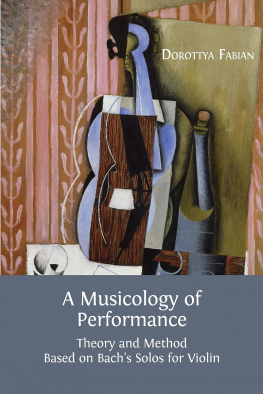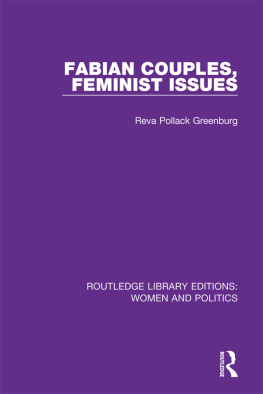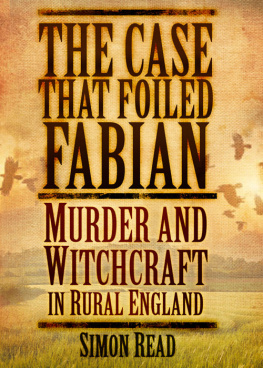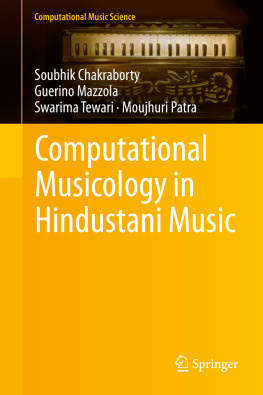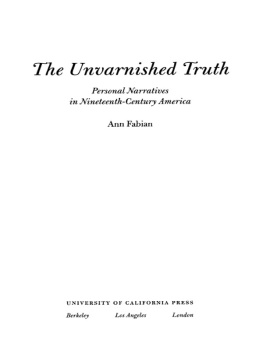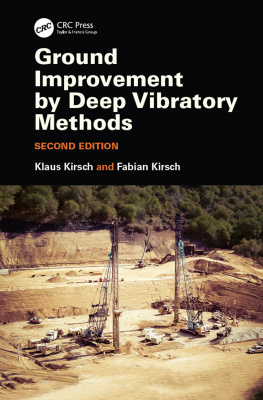Dorottya Fabian - A Musicology of Performance
Here you can read online Dorottya Fabian - A Musicology of Performance full text of the book (entire story) in english for free. Download pdf and epub, get meaning, cover and reviews about this ebook. year: 2019, publisher: Open Book Publishers, genre: Home and family. Description of the work, (preface) as well as reviews are available. Best literature library LitArk.com created for fans of good reading and offers a wide selection of genres:
Romance novel
Science fiction
Adventure
Detective
Science
History
Home and family
Prose
Art
Politics
Computer
Non-fiction
Religion
Business
Children
Humor
Choose a favorite category and find really read worthwhile books. Enjoy immersion in the world of imagination, feel the emotions of the characters or learn something new for yourself, make an fascinating discovery.
- Book:A Musicology of Performance
- Author:
- Publisher:Open Book Publishers
- Genre:
- Year:2019
- Rating:3 / 5
- Favourites:Add to favourites
- Your mark:
- 60
- 1
- 2
- 3
- 4
- 5
A Musicology of Performance: summary, description and annotation
We offer to read an annotation, description, summary or preface (depends on what the author of the book "A Musicology of Performance" wrote himself). If you haven't found the necessary information about the book — write in the comments, we will try to find it.
A Musicology of Performance — read online for free the complete book (whole text) full work
Below is the text of the book, divided by pages. System saving the place of the last page read, allows you to conveniently read the book "A Musicology of Performance" online for free, without having to search again every time where you left off. Put a bookmark, and you can go to the page where you finished reading at any time.
Font size:
Interval:
Bookmark:

- Publisher: Open Book Publishers
- Year of publication: 2015
- Published on OpenEdition Books: 1 June 2017
- Serie: OBP collection
- Electronic ISBN: 9782821881723

http://books.openedition.org
- ISBN: 9781783741526
- Number of pages: xxii + 342
FABIAN, Dorottya. A Musicology of Performance: Theory and Method Based on Bach's Solos for Violin. New edition [online]. Cambridge: Open Book Publishers, 2015 (generated 05 mai 2019). Available on the Internet: . ISBN: 9782821881723.
Open Book Publishers, 2015
Creative Commons - Attribution 4.0 International - CC BY 4.0
This book examines the nature of musical performance. In it, Dorottya Fabian explores the contributions and limitations of some of these approaches to performance, be they theoretical, cultural, historical, perceptual, or analytical. Through a detailed investigation of recent recordings of J. S. Bach's Six Sonatas and Partitas for Solo Violin, she demonstrates that music performance functions as a complex dynamical system. Only by crossing disciplinary boundaries, therefore, can we put the aural experience into words. A Musicology of Performance provides a model for such a method by adopting Deleuzian concepts and various empirical and interdisciplinary procedures.
Fabian provides a case study in the repertoire, while presenti ng new insights into the state of baroque performance practice at the turn of the twenty-first century. Through its wealth of audio examples, tables, and graphs, the book offers both a sensory and a scholarly account of musical performance. These interactive elements map the connections between historically informed
and mainstream performance styles, considering them in relation to broader cultural trends, violin schools, and individual artistic trajectories.
A Musicology of Performance is a must read for academics and post-graduate students and an essential reference point for the study of music performance, the early music movement, and Bachs opus.
Version 1.2. Minor edits made, October 2015 and June 2016.
The publication of the book was assisted by subventions from the Australian Academy of Humanities and the School of the Arts and Media of UNSW Australia.
This project has also been supported by an Australian Research Council Discovery Grant (DP0879616) and a UNSW Australia Faculty of Arts and Social Sciences Special Studies program in 2010, during which I took up a visiting fellowship at Clare Hall, Cambridge University which proved an ideal environment for focused work. In 2014 I received some tutoring and marking relief from the School of the Arts and Media at UNSW that contributed significantly to my ability to bring this project to a close.
I would like to thank my research assistants Bridget Kruithof, Elizabeth Cooney, Hae-Na Lee and Amanda Harris for help with data collection and some measurements; Daniel Bangert, Jennifer Butler, Daniel Leech-Wilkinson, Eitan Ornoy, Sean Pryor, Dario Sarlo, and Emery Schubert for insightful and corrective comments on earlier drafts; Kumaran Arul for encouragement and Ellen Hooper for stimulating discussions about performance research and Deleuze; two anonymous reviewers for their valuable comments and suggestions; Rachel Barton-Pine for her generosity in providing me with recordings of her concerts; and Alessandra Tosi and Bianca Gualandi of the superb editorial team at Open Book Publishers who helped make the multi-media presentation possible. I thank Corin Throsby for preparing the index.
Although I prepared a rough draft in 2011, due to other work commitments I could not return to it until 2014, so this book has had a long gestation and underwent substantial rethinking and re-writing. Sections, mostly on ornamentation and the interaction between period and mainstream playing styles have been presented at various academic gatherings. I wish to note my gratitude to Jane Davidson (University of Western Australia, Perth), Gary McPherson (Music, Mind and Wellbeing, University of Melbourne, Australia), Clive Brown and David Milsom (Leeds University), Ingrid Pearson (Royal College of Music, London), Jane Ginsborg (Royal Northern College of Music Manchester) for the invitations. Thanks are also due to the organizers of conferences in Aveiro (Portugal) and at the Orfeus Institute (Ghent), for the opportunity to present, and to the audiences for valuable questions and comments. An article on ornamentation in recent recordings of J. S. Bachs Solos for Violin was published in Min-ad , the Israeli Musicological Societys peer-reviewed journal. I thank them for kindly allowing me to re-use some of that material in chapter four of this book.
I would also like to record the generosity of John Butt, Janice Stockigt, Samantha Owens, and Neal Peres da Costa who wrote supporting letters to the Australian Academy of Humanities when I applied to them for a publications subvention. Thank you!
I am grateful to Katalin Komls for noting some additional misprints and notation errors in one of the score examples and thank Open Book Publishers, especially Bianca Gualandi, for their prompt action in correcting them for edition 1.2 (June 2016).
Framing all the great music out there only drags down its immediacy. [] Writing about music is like dancing about architectureits a really stupid thing to want to do.
Elvis Costello (b. 1954), singer-songwriter
Starting this book with such a quote is not just a flippant rhetorical device. It flags my very strongly felt unease regarding the subject matter of the undertaking and my research in general. It is not that I agree with music theorist Heinrich Schenker (1868-1935), who famously began his thesis The Art of Performance by stating that a composition does not require a performance in order to exist. [] The reading of the score is sufficient, If this question seems sensible then we have identified the reason why we need a musicology of performance .
Musicologya discipline invented in nineteenth-century Austria and Germany along the analogies of philology, historical and literary studieshas traditionally been concerned with the written text of music. To a great extent it still is. However, over the past few decades there has been an exponential growth in scholarship that focuses on music performance. The contention of this book is that we need a better theoretical framework for such studies; a framework that enables engagement with this richly complex phenomenon so that talking about music may be regarded less like dancing to architecture, less of a stupid thing to want to do.
The theoretical framework and analytical approaches I propose in this book are for studying musical performance. They do not shift the thinking about music to the different paradigm advocated by Nicholas Cook: music as performance. I am interested in a musicology that might assist us to deconstruct the complex that music performance entails: the act and its perception, the aesthetic and the technical, the cultural and the historical, the personal and the common. Therefore I propose a model that engages not only with the various elements and aspects but, importantly, with the interactions of these. I argue that music performance shows overwhelming similarities to the characteristics of complex dynamical systems. We may gain a better understanding of its layers and the functioning of its contributing elements if we approach it with an adequately complex method. I will demonstrate this by studying forty recordings of Johann Sebastian Bachs
Font size:
Interval:
Bookmark:
Similar books «A Musicology of Performance»
Look at similar books to A Musicology of Performance. We have selected literature similar in name and meaning in the hope of providing readers with more options to find new, interesting, not yet read works.
Discussion, reviews of the book A Musicology of Performance and just readers' own opinions. Leave your comments, write what you think about the work, its meaning or the main characters. Specify what exactly you liked and what you didn't like, and why you think so.

